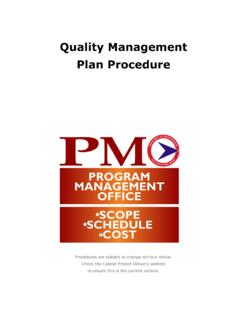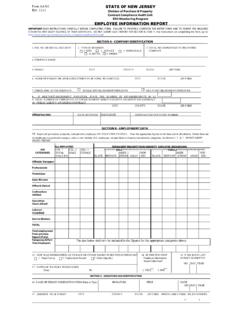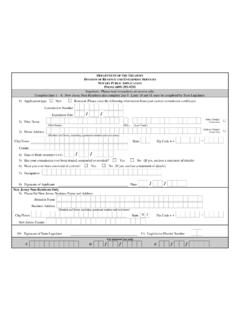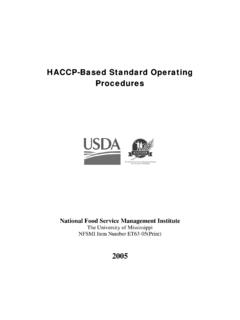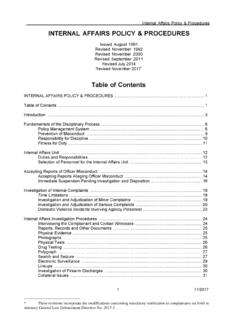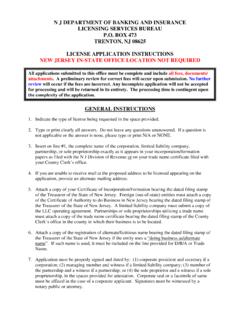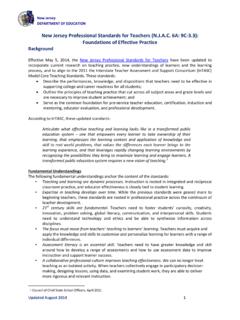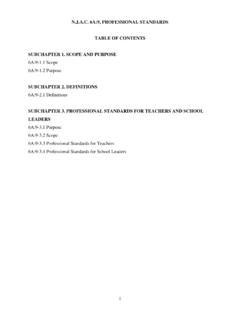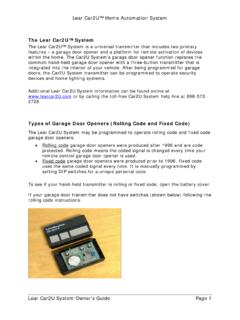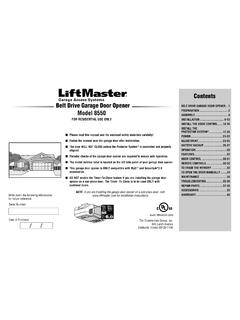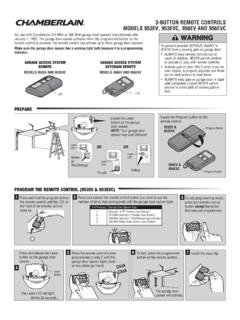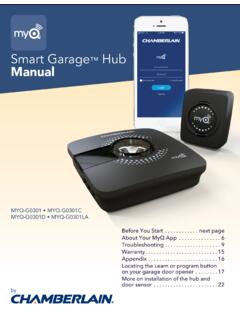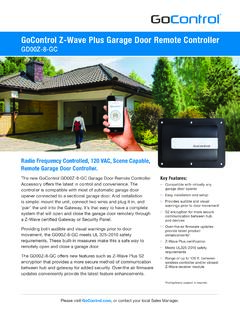Transcription of Contractors and New Jersey Taxes - State
1 Rev. 12/17 Contractors and New Jersey Taxes Tax Topic Bulletin S&U-3 Contents Introduction .. 1 Sales Tax Rate Change .. 2 General Information .. 2 Paying Sales Tax to Suppliers .. 5 Collecting Sales Tax From Property Owners .. 8 Fabricator/ Contractors .. 10 Floor Covering Dealers .. 11 Landscapers .. 12 Exemption Certificates .. 13 Registration .. 16 Sales Tax Returns and Payments .. 17 Employer Responsibilities .. 17 Introduction Contractors doing business in New Jersey have special responsibilities under New Jersey s Sales and Use Tax laws. This bulletin explains the rules that apply to Contractors for paying Sales or Use Tax to suppliers and collecting Sales Tax from property owners. The bulletin also discusses the procedures to be followed by fabricator/ Contractors and floor covering dealers when paying Sales Tax to suppliers and collecting Sales Tax from customers.
2 This document is designed to provide guidance to taxpayers and is accurate as of the date issued. Subsequent changes in tax law or its interpretation may affect the accuracy of this publication. Contractors and New Jersey Taxes Rev. 12/17 2 Sales Tax Rate Change Effective January 1, 2018, the New Jersey Sales and Use Tax rate decreases from to The tax rate was reduced from 7% to in 2017. Additional information about the Sales and Use Tax rate change is available online. General Information A contractor is an individual or business entity engaged in the business of improving, altering, or repairing the land, buildings, or other real property of others. Sales of materials and supplies to Contractors are taxable because the contractor is considered the final consumer (or end user) of these items.
3 Some examples of persons who are considered Contractors for New Jersey Sales Tax purposes are: builders, plumbers, electricians, carpenters, painters, paper hangers, roofers, masons, and landscapers. The term contractor also includes those who manufacture, sell, and install items that become part of real property ( , manufacturers and sellers of kitchen cabinets and vanities who also install those items). Such Contractors are known as fabricator/ Contractors . The work performed by a contractor can be a capital improvement, a repair, or a maintenance service. Contractors working in New Jersey are required to be registered with the State for tax purposes and to collect New Jersey Sales Tax on charges for labor when required. Subcontractor means a contractor who agrees to perform specified operations for another contractor ( , a prime contractor).
4 Real property means land and buildings and any property permanently attached to the land and/or buildings in such a way that its removal would result in substantial damage to the real property. Tangible personal property is material property that is not classified as real property. It has physical mass and can be touched ( , furniture, automobiles, tools, appliances) and includes natural gas and electricity. Tangible personal property differs from intangible personal property ( , stocks, bonds, good will, insurance) that has no physical substance. Construction equipment means any vehicle, machine, tool, implement, etc., used by a contractor in performing work on real property that does not become a physical part of the property and that is not consumed in performing the work.
5 Examples of construction equipment include: portable compressors, scaffolds, ladders, power and hand tools, back hoes, and cranes. Construction materials are items purchased by a contractor that will become part of the real property. For example, a 2 4 used as a stud will become part of the wall. Other Contractors and New Jersey Taxes Rev. 12/17 3 examples of construction materials include: pipes, valves, heating, cooling, and central air conditioning components. Construction supplies are items used on the construction job that do not become part of the property being worked on. They include: cleaning compounds, lubricants, grinding wheels, hacksaw blades, sandpaper, tarpaulins, and rope. Capital improvement means an installation of tangible personal property that increases the capital value or useful life of the real property (land or buildings).
6 The item(s) installed must be permanently attached to the real property. Capital improvements are exempt from tax with the exception of those listed under Taxable capital improvements. Exempt capital improvements include: All new construction* New siding New kitchen cabinets New kitchen fixtures Paving driveway New central air conditioner Clearing land for construction Attic ventilation fan New fence Electronic garage door opener Barbecue pit Solar energy window film In-ground swimming pool New awnings Fireplace Shed/gazebo (cement footings) Underground water sprinkler system Porch enclosure New heating system New electrical outlets Storm doors and windows New doors Flagpole (in concrete) New roof New gutters Rewiring New elevators New hot water heater New door locks New bathroom fixtures New tiled bath New deck Initial painting of new construction system *Other than the exceptions listed below.
7 Taxable capital improvements include: Planting shrubbery, trees, hedges, plants, etc. Seeding, sodding, grass plugging of new lawn Contractors and New Jersey Taxes Rev. 12/17 4 Clearing and filling land associated with seeding, sodding, etc. of new lawn or planting shrubbery, trees, etc., including tree and/or stump removal Installing hard-wired security, burglar, or fire system Installing carpeting and other flooring For additional information on taxable capital improvements, see publications ANJ-4, Landscapers & New Jersey Sales Tax; ANJ-5, Floor Covering Dealers & New Jersey Sales Tax; and ANJ-28, Investigation and Security Services & New Jersey Sales Tax. Repair (to real property) means work that maintains the existing value of the real property (land or buildings).
8 Repairs restore property to working condition; they do not add to its value or prolong its life. Examples of repairs include: Fixing loose bath tiles Fixing faulty plumbing Patching driveway potholes Repairing a cracked patio floor Fixing faulty electrical outlets Repairing gutters Pointing bricks Replacing torn screens Fixing leaks in a cellar Fixing a leaky roof In some situations, the difference between a repair and a capital improvement is the extent of the work that is done. For example, replacing a few loose bath tiles or a portion of a leaky roof is a repair to the existing real property. However, replacing all of the tiles or the entire roof with upgraded or improved materials would be an exempt capital improvement.
9 NOTE: Repairs or services to tangible personal property ( , refrigerators, washing machines, window air conditioners, or TV sets) are not repairs to real property. A repair person or service provider who does not work on the land or buildings of others is not a contractor for New Jersey Sales Tax purposes. Repair persons or service providers who are not Contractors follow different rules for paying Sales Tax to suppliers and collecting Sales Tax from their customers. For example, a television repair person must collect Sales Tax from the customer on the charges for both labor and the parts used for the repair. (And, the repair person, who is not a contractor for New Jersey Sales Tax purposes, may issue a resale certificate to purchase repair parts without paying Sales Tax.)
10 This bulletin covers only the rules that apply to Contractors who work on land or buildings. Maintenance services preserve the existing condition of property. Examples of maintenance services include: Mowing lawns Trimming trees Repainting interior or exterior Snow shoveling Power washing exterior of house Contractors and New Jersey Taxes Rev. 12/17 5 NOTE: Certain service providers who work on, but do not alter, real property ( , janitorial or cleaning services, pest control services) are not considered Contractors for New Jersey Sales Tax purposes. Businesses that are not considered Contractors follow different rules for paying Sales Tax to suppliers and collecting Sales Tax from their customers. They are required to charge the customers Sales Tax on the total amount of the bill and are permitted to issue a resale certificate to purchase certain materials and supplies used on the job without paying Sales Tax.
